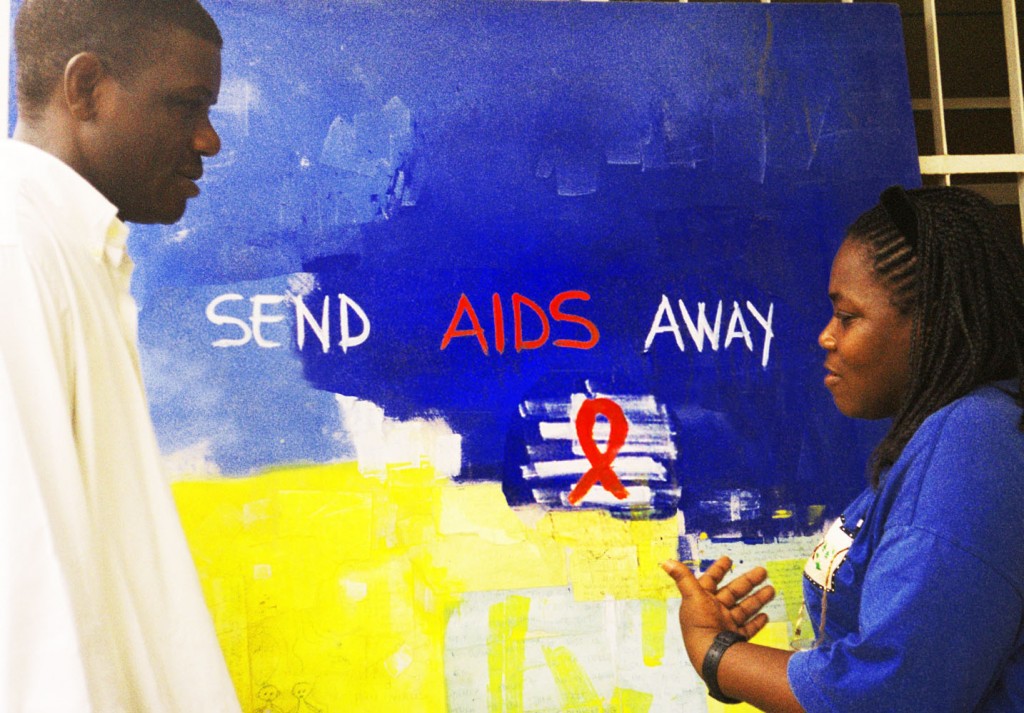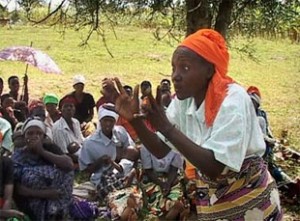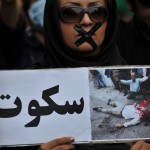Marie Mendene is an extraordinary activist from Cameroon and one of the first African women to say publicly that she lives with HIV, in the 1990s, when AIDS was a disease of shame and blame.
This is one of my favourite photos about AIDS [...]]]>

By M. Sayagues
Marie Mendene is an extraordinary activist from Cameroon and one of the first African women to say publicly that she lives with HIV, in the 1990s, when AIDS was a disease of shame and blame.
This is one of my favourite photos about AIDS in Africa. I took it at Sunshine, her NGO in Douala, in 2003, before antiretroviral treatment became widely available. Only a few Cameroonians in cities could get the life-saving pills.
The day I took the photo, Marie had queued for seven hours and received only half of her monthly ARV pills. She was understandably upset about the poor logistics and delivery of medicines. AIDS magnified all the inadequacies of health systems.
That was then. Today, nearly three million people in Africa are on ARV treatment. This seemed like a dream then, but activists were campaigning hard to make it come true.
Marie had a clear vision of activism. “We should go beyond the begging bowl and the appeal to compassion, beyond the stage of being used to do prevention and awareness, and become part of real-decision making around AIDS,” she told me.
Marie is to the right in the pic, with a fellow activist.
]]>What happens when the relatives of the murdered confront their murderers? What happens if they have to live with the murderers?
This is the theme of “My neighbour, my killer”, a film about Rwanda’s extraordinary attempt at reconciliation. This documentary by Anne Aghion, which premiered in New York two weeks ago at the [...]]]>

Remembering in Rwanda. Courtesy Anne Aghion
What happens when the relatives of the murdered confront their murderers? What happens if they have to live with the murderers?
This is the theme of “My neighbour, my killer”, a film about Rwanda’s extraordinary attempt at reconciliation. This documentary by Anne Aghion, which premiered in New York two weeks ago at the Human Rights Watch film festival, follows a gacaca or community court during five years.
Rwanda has set up some 12, 000 gacaca where killers face the relatives of those they killed during the genocide in 1994. (Read an interview with Aghion here).
A world and an age away, the same questions emerge in “Katyn”, the magnificent, sombre and sober epic movie made in 2008 by Polish director Andrzej Wajda about the Soviet massacre of 20,000 Poles during World War 2. During the ensuing five decades of occupation of Poland, the Soviets falsified history in a web of institutional lies and blamed the Nazis for the mass murders.
Both films are meditations on memory and history and their distortions, on loss, cruelty and forgiving, on imperfect justice, atonement and healing.
Women are central to both films – they are witness to horror and keepers of memory.
Think of the Madres de Plaza de Mayo haunting the Argentine junta with the photographs of their disappeared sons and daughters in the 1980s.
Gendering truth, gendering abuse
At truth and reconciliation commissions across the world, the bulk of testimonies by women dwell more on their loved ones and less on their own sufferings.
This is changing, as truth commissions become more gender-aware and seek gendered narratives. Earlier commissions, such as Argentina and Chile, were gender-neutral (some say gender-blind). South Africa was gender-neutral in its mandate but had special hearings for women. Peru’ commission had a gender unit. Later ones, like Haiti, Sierra Leone and Timor Leste, have looked specifically at sexual violence.
And more: the International Criminal Tribunal for Rwanda and the International Criminal Tribunal for the Former Yugoslavia have ruled that mass rape, sexual assault, sexual slavery, forced prostitution, forced abortion and forced pregnancy may be crimes against humanity, torture and genocide.
A third film that I saw recently is “Persepolis”, Marjane Satrapi’s wildly popular graphic novel turned animated movie, about her life growing up as a girl who likes Michael Jackson and punk music under the ayatollahs in Iran in the 1980s.

Protesting in Tehran. Photo: M. Avazbeigi
Its charming animation overlays a dreadful national and family history of imprisonment, torture, disappearances, failed revolutions, dashed political hopes, war and Shariah.
The movie conveys a poignant description of another form of gender abuse: the repression of women’s freedom to dress, move about, work, study, divorce, inherit, love and have fun.
Repressed, but not cowed into submission: as I write, on the streets across Iran, women are protesting, being beaten up, arrested and killed, challenging theocracy, demanding their rights.
(Read about women protesters in Iran and about dismantling a culture of impunity in Guatemala, Peru and Democratic Republic of Congo)
]]>